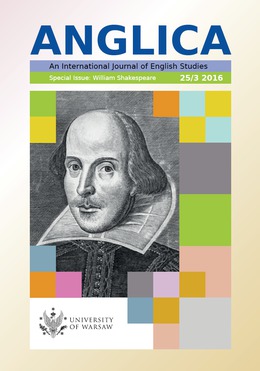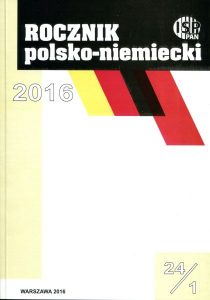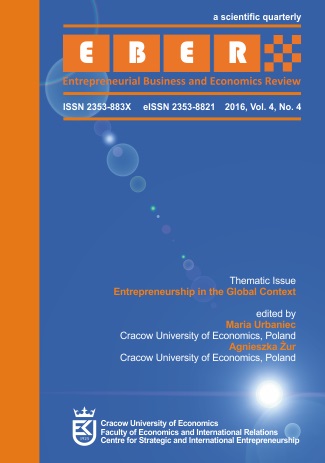
No Fear Shakespeare?
Introduction article on Shakespeare's plays and theatrics and their surprising, sometimes awry, meaningful adaptability to changing historical times
More...We kindly inform you that, as long as the subject affiliation of our 300.000+ articles is in progress, you might get unsufficient or no results on your third level or second level search. In this case, please broaden your search criteria.

Introduction article on Shakespeare's plays and theatrics and their surprising, sometimes awry, meaningful adaptability to changing historical times
More...
The article takes up the theme of Agamben’s violence without a form of justice and reads Shakespeare’s tragedy as spanned between Cordelia’s “nothing” at the start of the play and Lear’s “never” at its end. It also approaches a question of the relationship between, in Rousseau’s word, “l’homme naturel” and “citoyen.” Lear’s push towards a position of being “unaccommodated” suggests a move away from the organization of life previously holding its rule over men towards a marginal, peripheral zone with uncertain rules where man has to risk his own decisions rather than merely follow the custom.
More...
This article is an attempt to answer the questions that have long been bothering historians, political scientists, sociologists and lawyers, as well as ordinary people, nationals of the former anti-Hitler coalition and members of the fascist Berlin-Rome-Tokyo coalition: namely, who really won World War II and who lost the peace that put an end to the war in Europe and the world? Who had reasons to celebrate victory, and who suffered a bitter defeat and enslavement? The main thesis of this article is the observation that, in military terms, World War II was won by the states belonging to the anti-fascist coalition, and lost by Germany, Italy, Japan and their allies. However, in political and economic terms, World War II was won by Western countries led by the United States, and lost by Central and Eastern European countries, with the Soviet Union at the forefront. In international terms, the war and peace were won primarily by the United States and the Soviet Union. These countries have become global superpowers that created a new international order, called the Yalta-Potsdam governance.
More...
The Polish-German Treaty of Good Neighborliness and Friendly Cooperation that was signed between the Federal Republic of Germany and the Republic of Poland a quarter-century ago has repeatedly been the subject of debates, interpellations and deputies' questions at the German Federal Parliament. This article presents the most important debates and documents of the Bundestag, in which both deputies and members of the government expressed their opinions and positions with regard to the provisions of the treaty and its implementation.The aim of this study is to show changes to and differences in the rhetoric of parliamentarians representing various factions and representatives of the government in relation to this treaty over 20 years (i.e., from its signature and ratification in 1991 to the celebrations of its twentieth anniversary in 2011), and to present the priority issues raised in its context.
More...
Objective: The objective of this paper is to describe the features of firms’ organizational culture within four of Hofstede’s national culture dimensions and their potential relationships with internationalization, innovativeness and networking behaviour of firms. Research Design & Methods: This explorative quantitative research refers to results of an earlier study on internationalization, innovativeness and networking of firms inPoland. Descriptive statistics are used to depict the features of the organizational culture of the firms differing in behaviour in the three fields.Findings: The study leads to two hypotheses. First is that higher power distance is conducive for firms’ internationalization and innovativeness. The second is that the lower uncertainty avoidance supports internationalization, innovativeness and networking behaviour of firms. Implications & Recommendations: An attempt to create more consistent measures of organizational culture dimensions should be made in future analyses. This could help to achieve more sound results on the relationships between organizational culture and firms’ behaviour in internationalization, innovativeness and networking. Contribution & Value Added: The paper gives an insight into the organizational culture features relationships with a broad area of firms’ behaviour related with their ability to gain competitive advantage.
More...
Objective: This paper recounts the historical development of International Entrepreneurship as a study field, and demonstrates how concepts brought forth contribute to a broader understanding of fundamental international business and entrepreneurship theories. Research Design & Methods: The analytical work makes reference to the existing literature on International Entrepreneurship. Based on the categorisation of themes and sub-themes, the historical development of international entrepreneurship theory is recounted, creating a foundation for the assessment of its relationships and linkages with international business and entrepreneurship theories. Findings: The findings indicate that International Entrepreneurship is still in a developmental stage. However, the field is rich with novel ideas and concepts that can give an impetus to researchers as they strive to explore themes such as international entrepreneurial orientation and entrepreneurial internationalization. Implications & Recommendations: The lack of theoretical foundation presents challenges to researchers. Research must be directed at answering the fundamental questions that distinguish International Entrepreneurship from the two related, but more established fields; international business and entrepreneurship. Contribution & Value Added: The paper provides a point of reference for scholars that want to attain a comprehensive insight into the state of international entrepreneurial research, and distinctions from, and relevance to the fields of international business and entrepreneurship.
More...
Objective: The aim of our paper is to analyse the entrepreneurial activity drivers of youth and young adults in Visegrad countries, considering the opportunity/necessity motivation dichotomy. Research Design & Methods: We employ the Global Entrepreneurship Monitor data for young individuals (18 to 34 years) from V4 countries for years 2011 to 2013. We use the binomial logistic regression modelling with logit transformation. Separate models are constructed for youth and young adults, as well as for opportunity- and necessity-driven entrepreneurial activity. Findings: We found common drivers and distinctive attributes affecting involvement of young people in business start-up according to its motivation. Self-confidence and access to networks are universally important factors. In most examined cases, fear of failure and being a female reduces chance of business start-up. Especially among youth, being a student significantly inhibits involvement in enterprising efforts. Implications & Recommendations: In order to support youth entrepreneurship, an emphasis should be put on education and training to build skills and knowledge required to business start-up, together with capacity to spot opportunities, and reduce fear of failure. Also, formal and informal networking plays an important role. Contribution & Value Added: Based on empirical analysis, our findings point out the key drivers of entrepreneurial activity among young people in V4 countries. We show directions for policy makers aiming to foster entrepreneurship within young generation as both way to exploit available business opportunities, as well as reaction to necessity situations
More...
Objective: This study investigates students’ entrepreneurial activities and aims to answer questions regarding to what extent do students utilize the knowledge gained during their studies and the personal connections acquired at universities, as well as what role a family business background plays in the development of students’ business start-ups. Research Design & Methods: This paper is based on the database of the GUESSS project investigates 658 student entrepreneurs (so-called ‘active entrepreneurs’) who have already established businesses of their own. Findings: The rate of self-employment among Hungarian students who study in tertiary education and consider themselves to be entrepreneurs is high. Motivations and entrepreneurial efforts differ from those who owns a larger company, they do not necessarily intend to make an entrepreneurial path a career option in the long run. A family business background and family support play a determining role in entrepreneurship and business start-ups, while entrepreneurial training and courses offered at higher institutions are not reflected in students’ entrepreneurial activities. Implications & Recommendations: Universities should offer not only conventional business courses (for example, business planning), but also new forms of education so that students meet various entrepreneurial tasks and problems, make decisions in different situations, explore and acquaint themselves with entrepreneurship. Contribution & Value Added: The study provides literature overview of youth entrepreneurship, describes the main characteristics of students’ enterprises and contributes to understanding the factors of youth entrepreneurship.
More...
Objective: In Poland entrepreneurship is often viewed as an extremely risky process and entrepreneurs are often portrayed in a negative light. The research goals of our exploratory study is to identify the entreprenurship metaphors among Polish management students. Research Design & Methods: Authors decided to run both qualitative and quantitative research. In the first part we addressed 124 management students on three levels BA, MA and MBA. The respondents were asked to give their metaphorical expressions on paper. The next step was to prepare a questionnaire based on 7 point Likert scale. This questionnaire was run among BA management student group composed of 82 students. Findings: Our results suggest that there are several major entrepreneurial narratives evident among all three groups including creativity and innovation, competition, war, journey, risk, adventure and exploitation. Implications & Recommendations: The empirical findings serve as a starting point for further in-depth research in this area. It is recommended that in order to gain a complete picture of the issues underlying the results, both qualitative and quantitative research on a bigger sample should be undertaken. Contribution & Value Added: The originality of this work lies in studying some aspects of entrepreneurship metaphors among non-entrepreneurs in Poland. With regards to the research limitation, it must be highlighted that it was a pilot study and the results cannot be generalized.
More...
Objective: The paper aims at identifying and assessing the significance of work-life balance determinants between the Youth of highly developed societies and its implications for human resources management on the example of Norway. Research Design & Methods: The research target group consists of 236 respondents recruited among Norwegian tertiary education students. It employed literature analysis, two-stage exploratory research: direct individual in-depth interviews, survey based on a self-administered, web-based questionnaire with single-answer, limited choice qualitative & quantitative, as well as explanatory research (informal moderated group discussions). Findings: The research on perceptions of determinants of quality of life and attractiveness of life strategies shows that in a country with relatively high socio-economic development level, such as Norway, differences in rankings do exist. They can be observed in relevance to both material and non-material QoL determinants. Implications & Recommendations: The study revealed a need for deeper research on individually driven early decision-making of future employees and entrepreneurs. This will result in closer modelling of socio-economic phenomena, including more accurate adaptation to trends on the labour market and creation of new business models. Contribution & Value Added: Research value added comes from the comparison of perceptions of quality of life determinants between countries at various stages of socio-economic development and its implications for human resource management.
More...
In the past, Silesian was treated as a subdialect of the Polish language (and sometimes of Czech). During the 1990s, following the fall of communism and the establishment of democracy in Poland, most Silesian-speakers decided to treat Silesian as a language in its own right. It became part and parcel of their effort to shed the status of second-class citizens that had been imposed on them in the interwar and communist Poland. Warsaw has not recognized this language yet, but, despite suffering this (quite humiliating) disadvantage, Silesian-speakers have produced a growing number of articles, books, websites, radio and television programmes in their language, winning a recognition for Silesian as a language abroad and among scholars. It appears that the Polish administration's rigid stance toward the Silesians and their language is dictated by the logic of ethnolinguistic nationalism, which equates the legitimacy and stability of the nation-state with the full ethnolinguistic homogeneity of its population. This article sketches the trajectory of the main events and probes into the state of the discourse on the issue of Silesian language and culture during the quarter of a century after the fall of communism in 1989.
More...
The law on National and Ethnic Minorities and Regional Language of 2005 regulates not only matters related to the preservation and development of the cultural identity of national and ethnic minorities in Poland, but also the problem of bilingualism, auxiliary language and bilingual names. It allows minorities living in Poland to express and emphasize their presence, among other things, by placing names in the minority language on signs next to the official names of places and physiographic objects. Polish society was most concerned about the introduction of dual place names and the use of minority languages as auxiliary languages in offices in some municipalities in Poland, especially in Upper Silesia. Issues of cultural cultivation and the use of education aroused far fewer objections and did not cause doubts.This article shows not only the origins and the role of the introduction of bilingual village and office signs and the German language as the auxiliary language in offices in Upper Silesian municipalities (in the provinces of Opole and Silesia), but also the perception of this phenomenon by both the German minority and the majority society. This paper also presents the legal and sociological aspects of the discussed issues.
More...
The aim of this article is to show how the Fourth Department (Western Europe) of the Ministry of Foreign Affairs of the Polish People's Republic (PRL) assessed its relations with Austria in 1980-1983. This topic is analysed from the perspective of the existing research on Polish foreign policy and its relations with the West. The article mainly presents the Polish perspective of bilateral relations and efforts to restore good trade relations with Austria. Before martial law was introduced in the PRL, this neutral Western country had evidently favoured Polish affairs in the international arena. The contribution of Bruno Kreisky’s personal diplomacy to the development of trade relations with the PRL is also taken into account. There is a thesis that Austria was one of the first countries in the West which renewed diplomatic relations with the PRL after their having been frozen in December 1981. In the light of the existing studies, such measures were first taken in 1984 in the so-called fraternal countries and in 1985 in Western countries. Materials taken into account in this analysis have not yet been published, and come from the archives of the Ministry of Foreign Affairs. In the Polish diplomatic documents from 1980-1983, Austria has the image of “a partner in difficult times.” Since 1970, the Austrian government under the leadership of Chancellor Bruno Kreisky was at first perceived exceptionally well in the PRL, compared to other Western countries. After the imposition of martial law, Vienna repeatedly confirmed its willingness to provide Poland with not just humanitarian, but also diplomatic and economic support, refraining from making negative comments on Polish authorities on the international forum. Kreisky avoided sharp statements against Polish authorities, fearing the possible escalation of the conflict. He was convinced that the shift in power was not possible at that time and in that area. He judged negatively Western economic sanctions for two reasons. As he claimed, they struck only the society and common people, having no impact on the decisions of Polish politicians; on the other hand, they threatened the interests of Austria, which was inclined to import Polish raw materials and repay the existing financial obligations. Shortly after the exchange of correspondence on the circumstances of the martial law, the Austrian side, through the Embassy in Vienna, offered to re-establish correct relations. They excluded the possibility of conducting official state visits until the lifting of martial law; however, in April 1983, the first working group meeting with Otto von Bauer, the Deputy Secretary General of the Ministry of Foreign Affairs of Austria, was arranged in Vienna. This event was treated as an example to follow in the other diplomatic posts of the Fourth Department.
More...
This article focuses on the impact of liberal ideas on Austrian politics. Particular attention is devoted to the conservative-liberal coalition lead by Chancellor Wolfgang Schüssel, who ruled in 2000-2006. The author presents the sources of the Austrian Chancellor’s ideological inspirations and confronts the ideas declared by him and his coalition with reality. Schüssel’s rule is described from a broader perspective in order to answer the question of whether the time of the neoliberal “breakthrough” was indeed a breakthrough, and how much of that has been left in Austrian politics?
More...





The present study focuses on the origin of the idiom shall’s ‘shall we’ in two corpora: the online database The Collected Works of Shakespeare and a corpus of Ben Jonson workscompiled on the basis of online html texts linked to the webpage Luminarium: Anthologyof English Literature. The Works of Ben Jonson. The paper discusses available accounts of the issue offered by late nineteenth and early twentieth century linguists and juxtaposes them with new findings and observations. The author analyzes data concerning shall’s,shall us, shall we, let’s and let us to suggest a new hypothesis on the potential rise of shall’s, i.e. that the idiom resulted from a blending of shall we and let’s.
More...